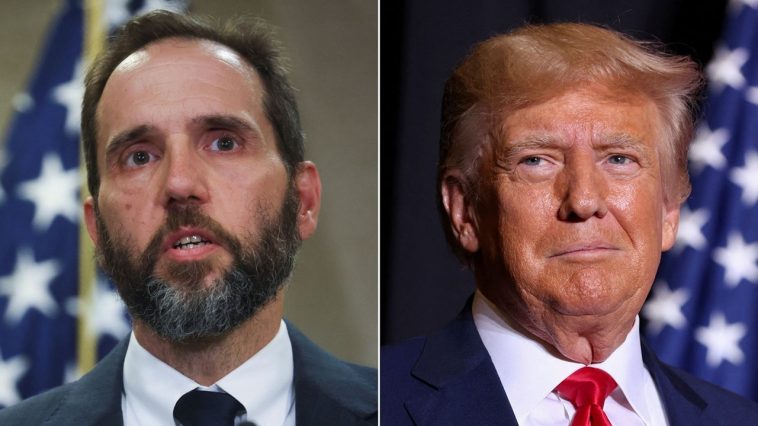LISTEN HERE:
A federal court has negated the petition of Special Counsel Jack Smith to retain confidentiality of certain records in the court proceedings involving the previously classified documents allegedly kept by the former President Donald Trump. The presiding Judge Aileen Cannon in the same case disregarded the appeal made by Smith to continue concealing certain documents from Trump and his defense team.
The pronouncement, issued on December 4, envisioned the court clerk to make several documents public, which were previously kept hidden due to special counsel’s request. These documents are part of a lawsuit accusing Trump of storing highly classified government records, including those stated as ‘top secret’, at his Mar-a-Lago residential property. The former president, however, has consistently maintained that he had utilized presidential privileges to declassify said documents.
In this ongoing legal battle, Trump asserts that he is innocent and describes this case as a politically motivated tactic to thwart his potential 2024 candidacy for the presidency. The lawsuit also accuses Walter Nauta, a long-standing aide of the former president, and Carlos De Oliveira, the manager of Mar-a-Lago, as accomplices; both have also categorically denied all allegations.
Trump’s defense along with Smith’s prosecution team has been ardently debating over which classified documents the defense should be allowed to inspect. The recent decision by the presiding judge to unseal certain documents could act as a small victory for Trump and his co-defendants.
Citing the judge’s order dated December 4, ‘Given the Special Counsel’s response to the Defendant’s request to unseal dockets, considering the principle of public accessibility to judicial documents, the clerk is instructed to unseal docket entries 223, 224, and 230.’ This uncovers the previously sealed response by prosecutors to a court order from December 1.
The newly made public document reveals that while Smith’s team agreed to unveil the documents as urged by the defense, they were adamant about having some parts redacted. As per the document, ‘The defendants haven’t contested the Government’s request, but have maintained their right to dispute these redactions in the future.’
In the now public court document, Smith’s team confessed that they initially opposed the unsealing of documents 223 and 224, fearing it could expose to the defense some not classified yet strategic information related to the Government’s planned CIPA Section 4 motion. This information could give the defense an upper hand to counter Smith’s legal strategies more effectively.
Trump has been alleged of keeping national defense information, hence his case is going to be presented under the intricate laws delineated in the Classified Information Procedures Act (CIPA). A motion under CIPA, Section 4, seeks the court’s approval to redact certain information from the classified data handed over to the defense team.
The entire procedure under CIPA is methodical and demands one stage to be completed before advancing to the next.
The complexity of the CIPA process makes it such that any delay at one stage invariably influences the timeline of the entire trial. Both the defense and the prosecution have divergent views regarding the timeline of the trial. While Trump’s attorneys hope for the trial to be scheduled post the 2024 elections, Smith’s team has advocated for an expedited schedule.
Per Smith in the 230 filing, his revised stance towards making the documents public is due to the court’s previous mandate for the full, unredacted versions of the 223 and 224 docket entries to be provided to Trump’s legal team.
Smith notes, ‘Since the Court dismissed that stance and commanded the Government to give unredacted versions of the two dockets to the defense counsel, there’s no reason to keep them from the public.’
In a recent ruling in this case, Judge Cannon partially granted and denied the request made by the defense to delay deadlines, including the trial. Contemplating a potential change to the trial date, Judge Cannon rejected the defense’s request but mentioned she would consider a delay during a scheduling conference slated for March 1, 2024, which is only three days before the commencement of another trial involving Trump.
Owing to the magnitude of classified materials involved in this case, the judge proposed a feasible, adjusted timeline considering the evolving intricacies of this case. Recognizing Trump’s multiple other court proceedings, the order enumerates newly set deadlines for discovery, including a joint discovery status report due by January 9, 2024, and a deadline of February 22, 2024, for pretrial motions.
In a separate case in Washington, where Smith is also the Special Counsel, Trump is charged with unlawfully meddling with the 2020 elections with the trial set for March 4, 2024.
The defense has expressed the need for additional time to scrutinize an enormous amount of discovery: including over a million pages of unclassified material, over 5,000 pages of classified data, and 60 terabytes of security video footages. Furthermore, they’ve voiced their intent to request more materials from both the special counsel’s office and the FBI.



